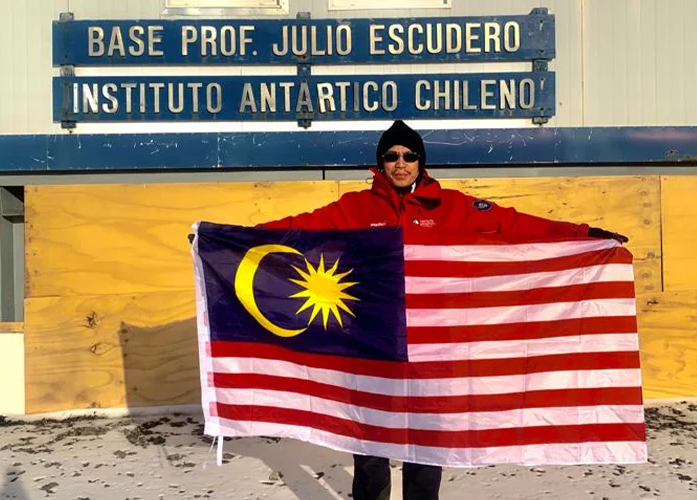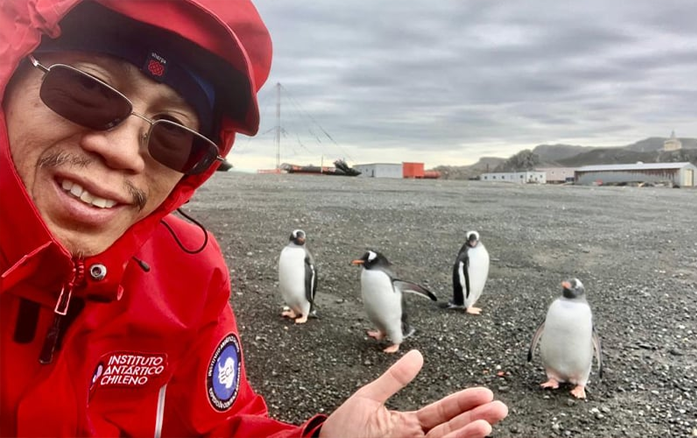 Cold. Inhospitable. Lonely. The frozen land of Antarctica is a place few people can boast of ever seeing with their own eyes, let alone of visiting it.
Cold. Inhospitable. Lonely. The frozen land of Antarctica is a place few people can boast of ever seeing with their own eyes, let alone of visiting it.
For Malaysians, the southern continent is so faraway that one could even compare it to another planet altogether.
Yet, almost unbelievably so, there is a Malaysian there right now, braving the elements in the name of science.
Justin Sentian, a researcher from Universiti Malaysia Sabah, is currently based in the Professor Julio Escudero Base Station, a research station 13,000km away from Kuala Lumpur.
This isn’t Sentian’s Antarctic rodeo, as he spent three months here in 2018; this year though, he will be here for the next six months.
Ranau-born Sentian, is a polar atmospheric scientist and he is currently observing how detectable the effects of human activity are in the polar region.
Despite his extreme distance from Malaysia, the 54-year-old scientist still had sufficient internet connectivity to speak to FMT on life there and his research in Antarctica.
He said that lonely Antarctica is a place particularly sensitive to environmental change. “Everybody knows that Antarctica is considered to be clean of human activity. If you want to see changes Earth is experiencing, it’s best to experience it in Antarctica,” he told FMT.
“Any changes here indicate the world is changing, or that there’s something wrong happening at the global scale.”
This research, said Sentian, is thus meant to prove that people far removed from Antarctica, Malaysians for example, are still linked to it.
“Remember the ozone hole? There was a hole above Antarctica which was caused by the use of chlorofluorocarbons. This CFC came from every part of the world, including Malaysia!”
It was only through international awareness and collaboration that CFC use was reduced and the ozone eventually healed.
The last time Sentian was here, it was summer and he was collecting data on the concentration of ground ozone. Now, he’s here in winter to ascertain how the seasons affect his results.
Science aside, how is someone from tropical Malaysia dealing with Antarctic conditions?
“Most of the time, my activities are limited to being indoors. When I set up my experiments and take measurements outside, I cannot stay there for too long because of the harsh conditions.”
Funnily, winter only starts in May, but it is already bitterly cold. Now Sentian can only hope that he’ll be ready to face winter once it truly arrives.
The research station itself is quite small, with movement being limited, said Sentian, and when winter comes, everyone will be huddling inside that cramped space.
In addition to the weather, Sentian had to leave behind a lot of his scientific equipment in Sabah, with transportation to Antarctica being a feat of its own.
“Bringing that here from Malaysia is very costly,” he said, adding that he only brought what equipment he could.
There’s also the matter of food, with Sentian admitting he misses Malaysian fare. “The only Malaysian food I brought was Maggi,” he chuckled. “I’m stocking it for winter.”
For the most part, he has been eating Chilean food, cooked by the two other Chilean scientists and nine support staff from the Chilean navy living on the base.
Sentian is in good company though, with the Chileans having a barbeque every Friday, which helps to keep morale up.
And to stay physically active once winter rolls around, Sentian is free to use the exercise equipment available in the station’s gymnasium.
“There’s also a big satellite TV here; you can get many good channels here,” he said, adding that he and his colleagues often fill their free time with rounds of games.
One burning question Sentian is happy to answer is regarding his experience with a certain type of bird native to Antarctica.
Penguins often clamour around Sentian when he’s out taking scientific samples. “They are very tame. They come to you. There’s always a penguin around there, just standing next to me.”
Despite how adorable they are, Sentian is careful not to lay a finger on them. “One of the rules scientists have, is to minimise disturbance to natural wildlife.
“If the penguins come to you, you can let them come. But you can’t do anything to them. Of course, I didn’t touch them. Still, I enjoy their company.”



